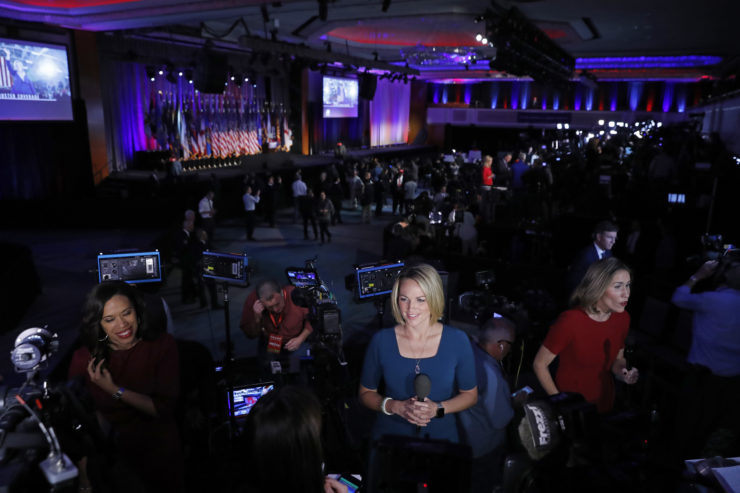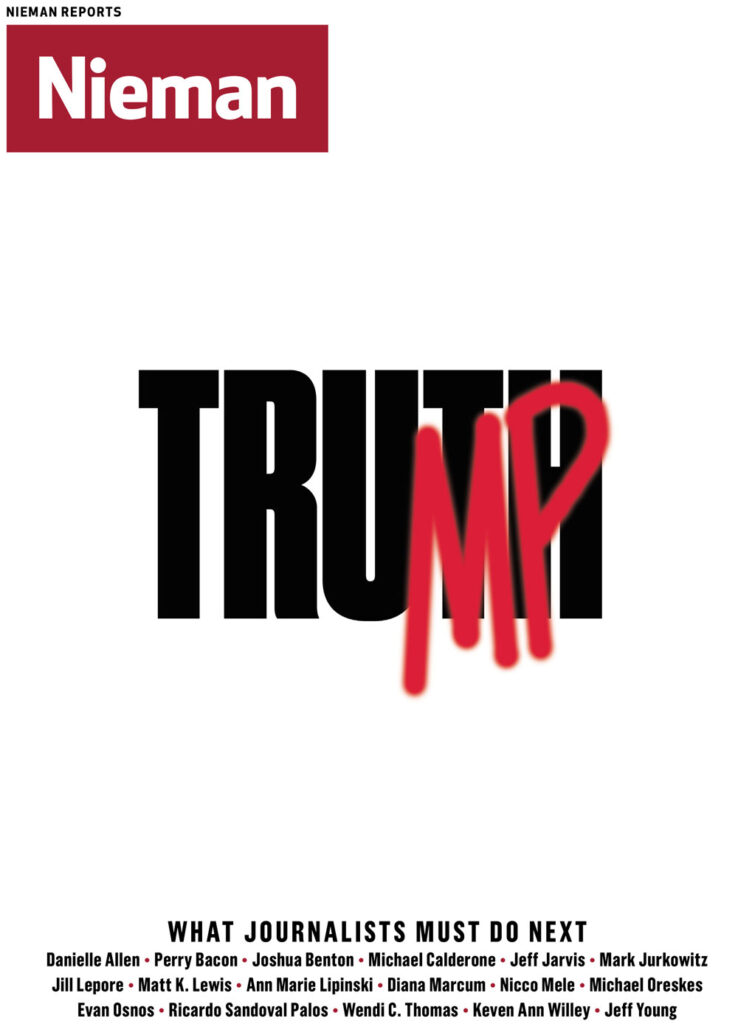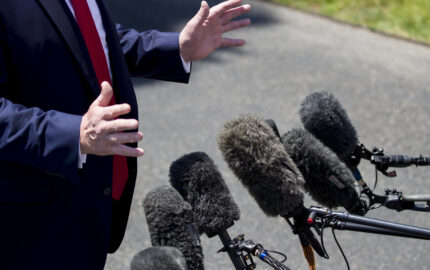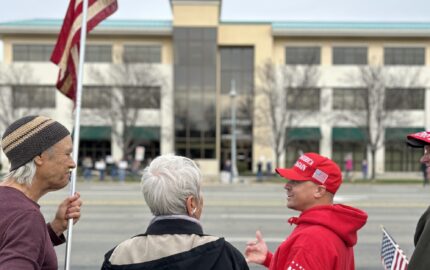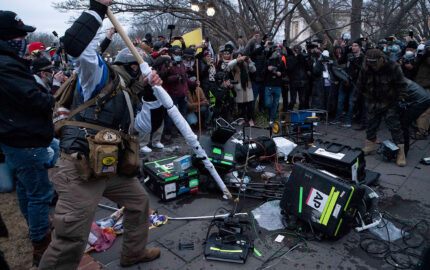Focus is one of journalism’s most important skills. It's that separating the wheat from the chaff thing. In an age of distraction we need THAT skill now more than ever. (Is anyone going to explain why Richard Nixon's 1972 campaign slogan has made such a comeback?) We need to apply that focus to ourselves right now. The question isn't, “What lessons can we draw from 2016?” Answers have already flooded in to Nieman at a pace to induce future-of-news vertigo.
The question is, “Which of those many answers should we focus on?”
To pick, we first have to decide our goal. Are we asking which lessons we need to heed to create a stronger media? Or a stronger democracy?
We need to articulate this. Because we talk a lot about our crucial, dare I say privileged, role as guardians of democracy. Yet, not all of our actions conform to the notion that democratic society is our North Star. We know all about news organizations that pursue partisan factions as audience. But what about news organizations with clearly elite strategies? They seek wealthier audiences, for example, because that's who advertisers buy. Is a partisan niche any worse for democratic discourse than an economic one?
This is hardly all our fault. The business crisis of journalism has been intense. A paywall, to pick one example, may reduce access to information citizens need. But without it, there won’t be revenue to sustain the news organization as it gathers that information. And any effort to create broadly democratic conversations by reaching broader audiences runs headlong into the role of our "platform partners," Facebook, Google, Twitter, and the rest.
Much has been said about all this by more business-savvy people. So for here and now, let's stipulate that our goal is to strengthen our democratic purpose in the faith that if we focus on fulfilling society's needs, successful business models (including serious efforts by platform owners) will follow. Let's face it, this is actually our only course. Strong business models and a weak democracy won't really help us, as our colleagues in Turkey are finding.
So with that stipulation, what should we do?
Here are four steps to strengthening journalism's role in our democracy: We should focus on being more local, more networked, more diverse, and fiercely independent. This will improve community access to reliable information, rebuild trust in us, and strengthen democracy.
LOCAL
All politics is local, said Tip O’Neill. So is the most essential journalism. Whether it is journalism that holds local public figures to account or that connects communities across divides of race, creed, class, origins, or orientation. We have an essential role in bursting filter bubbles. This can most effectively and productively be done in local communities. Some of these communities are physically isolated from others (more on that under “networked”). But in many cases, they are actually cheek by jowl.
During the election, David Greene of NPR rode a public bus line that connected downtown Milwaukee and adjacent suburbs. He traversed from Clinton country to Trump country, capturing how citizens viewed each other. Those communities are all within the circulation of the Journal Sentinel and the signal of WUWM, Milwaukee Public Radio. I mention them only because they have a record of working together to serve their communities better.
There is a lot more to be done. Milwaukee is a lucky place to have the Journal Sentinel and WUWM, as well as Wisconsin Public Radio. Many local communities have become little more than "news deserts," according to a recent report from the University of North Carolina. If we mean to be one country, we should no more tolerate letting some of our fellow citizens go ill-informed than we would consent to see them ill-fed or ill-clothed. The Public Broadcasting Act instructed us in public media 50 years ago to fulfill needs unmet by commercial media. The loss of local journalism is clearly one of those needs.
NETWORKED
My friend and colleague Joyce Dehli addressed this forcefully in another Nieman piece. We can't expect to simply rebuild all of the newsrooms damaged by the disruption of the newspaper industry. We need to build something new. Many folks are using the word collaboration here to describe how by combining forces we can maintain and even expand strong journalism. When I talk about networked I mean all that and more.
NPR is already a network of community-based news organizations in every state. (We have 264 members broadcasting over close to 1,000 signals, radiospeak for channels.) We are committed to working together to strengthen their local journalism, which then becomes the basis for the stories we tell the country about itself. In other words, our sense of the country doesn't come from the coasts. It comes from everywhere.
Like, say, Laramie, Wyoming. There were many questions about President-elect Trump's promise to save coal mining jobs. Stephanie Joyce at Wyoming Public Radio understood both the miners and the industry. Coal's fundamental problem, she reported from Laramie, isn't government regulations, which President-elect Trump could change. Coal’s problem is the rise of cheap natural gas, which Trump has vowed to expand. More gas, less coal. There is no substitute for local knowledge and on-the-ground reporting.
There are efforts in many states and cities to form not-for-profit news organizations to take up the slack left by the decline of newspaper newsrooms. For 2017, NPR will be working closely with public radio stations and others to strengthen coverage of state legislatures and government. Public radio sounds like America because it is everywhere in America. We aren't the only ones with this idea. Gannett is building a network of newspapers with very much the same goal. A democracy the size of the United States has plenty of room for both of us.
DIVERSE
The subject of diversity has been on newsroom agendas for a long time. We haven't done a good enough job. Not only do we still have much work to do to bring journalists of color into our newsrooms and into positions of responsibility, we have to recognize that broadening our perspectives includes others, too. Take my NPR colleague, Sarah McCammon, who covered the Trump campaign this year. Sarah is from Kansas City, Missouri. She was raised in a conservative Christian home. Her background made a real difference in her ability to cover evangelicals. "These aren’t zoo creatures,” McCammon told The Pub, a podcast covering public media. “These are human beings who think differently than a lot of people in Washington.”
Diversity of audience is crucial here too. Danielle Allen raises the important question: Who are we speaking to? There are a lot of business pressures that push many media companies toward niche strategies. If we accept our role as serving the public’s information needs in a democratic society we need to include all of the public. That means it may fall to journalists to argue inside our own organizations for approaches that reach out for broader audiences rather than narrowing them based on income or any other demographic. It also means speaking forcefully to the platform companies like Facebook, Google, and the rest in favor of transparency in their algorithms and a recognition that they have a large effect on who gets the work we do. We have a democratic responsibility and so do they.
INDEPENDENT
This is everything. Without it the rest won't matter. Ask yourself as a journalist, “Who do I work for?” If we can't reply that our first allegiance is to the public, we confirm the worst of what a lot of that public thinks of us: That we are tools of some amorphous corporate establishment. To win the public's trust, we have to be the public's media. Connected locally. Networked nationally and awash in diverse perspectives on what is newsworthy and how to report it. When we ask hard questions or hold leaders to account we must always remember we are doing it on the public's behalf, not for our own aggrandizement or advancement. We are their eyes and ears. Their windows on other points of view. We must be their information partners in the work required of each citizen to make democracy effective.
We have a distance to travel to become this. But if we focus our efforts we can do it.
